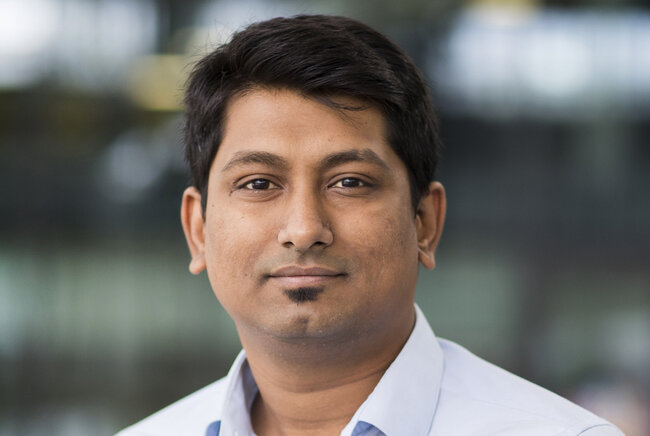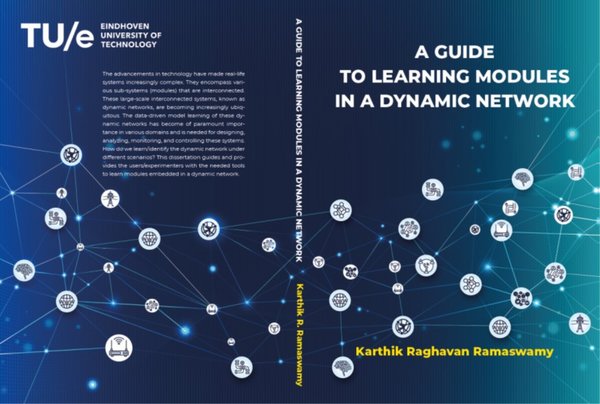A guide for experimenters to develop mathematical models of large-scale complex dynamic networks
Karthik Raghavan Ramaswamy gained his PhD cum laude on developing novel data-driven modeling tools and techniques to improve insight into complex networked systems, such as hi-tech machines, power grids, biological networks and social networks.

Many real-life systems, such as biological systems, semiconductor manufacturing machines and transportation systems, are becoming increasingly complex. They encompass various sub-systems (modules) that are interconnected which makes it difficult to find mathematical models of these interconnected sub-systems. Developing mathematical models of these ‘dynamic networks’ from data has become of paramount importance in various domains and is needed for designing, diagnosing, monitoring, and controlling these systems. By exploiting machine learning, Bayesian methods, system identification and graph theory, Karthik Raghavan Ramaswamy developed a framework that guides the experimenters in the complex maze of modeling dynamic networks and provides them with the needed techniques and tools to develop high-quality models of the sub-systems embedded in a dynamic network under different scenarios.
Complex interconnected systems are becoming increasingly ubiquitous, and data-driven modeling of large-scale interconnected systems, known as dynamic networks, has attracted increasing attention. The complex interconnection between many sub-systems in large-scale dynamic networks poses a lot of challenges to model the dynamic networks. This makes the classical approaches for data-driven modeling, originally designed for small-scale systems, inadequate for modeling even a single sub-system in a large-scale dynamic network.
There are many practical challenges in modeling the sub-systems in a dynamic network like handling confounding variables, increasing flexibility in sensor and actuator placement locations in the network, selecting the right model structure, estimating the interconnection structure of the network, and reducing complexity and developing effective algorithms that are scalable to large-scale networks. Karthik Ramaswamy addressed in his PhD research these challenges and provided solution by developing novel estimation methods, algorithms and graphical tools, which culminated in a step-by-step guide that helps people with limited expertise in modeling dynamic networks to develop high-quality models of dynamic networks from data under different scenarios. He achieved this by exploiting machine learning, system identification, Bayesian methods and graph theory. The results of his PhD research find its importance in many applications, e.g., fault diagnosis in Printed Circuit Board Assembly (PCBA), monitoring and diagnosis of hi-tech systems like semiconductor machinery or printing machinery, monitoring in pipelines, inference of brain connectivity, vehicle platoons, power grids and biological networks.
SYSDYNET ERC project: www.sysdynet.eu

About Karthik:
Karthik Raghavan Ramaswamy received his Bachelor's (with Distinction and gold medal) in Electrical and Electronics Engineering in 2011 from Anna University. He obtained his Master's (with great appreciation) in Systems and Control from the Eindhoven University of Technology in 2017. In 2022 he obtained his Ph.D. (cum laude) from the Department of Electrical Engineering, Eindhoven University of Technology, The Netherlands. From 2011 to 2015 he was Control & Automation design engineer at Larsen & Toubro and also obtained his M.B.A. degree in 2014. He is currently working as a Design Engineer with ASML, Veldhoven, The Netherlands. His research interests are in the area of machine learning, Bayesian methods, data-driven modeling of complex systems, and dynamic network identification.
Karthik Raghavan Ramaswamy defended his PhD (cum laude) on May 3rd with the title: ‘A guide to learning modules in a dynamic network’. Promotor: Prof. dr. ir. Paul M. J. Van den Hof, TU/e and Prof. dr. Siep Wieland, TU/e. Co-promotor: Dr. Giulio Bottegal, ASML. To check out his dissertation, click the link here.
Contact : k.r.ramaswamy89@gmail.com (Karthik Ramaswamy)